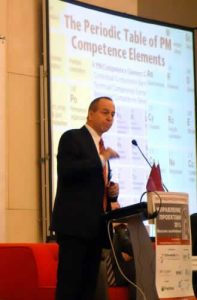Mission Possible! Two recent experiences resulted in the title of this article: First, we were recently in Russia to keynote a very successful Project Management conference. Second, we recently saw the latest updates in Project Management Institute’s “Are You Ready?” campaign. For the last few years, they have been pivoting to embrace a different foundation for learning and certification. These are the leadership/behavioral and context/strategic linkage aspects long-advocated by IPMA, International Project Management Association.
I especially appreciate this pivoting action because these were our PM consulting firm’s key differentiators from the early 1980s. Our clients’ success was based on their early embrace of the importance of these demonstrated competences. And, I have long-fought for the consistent application of these factors that make the greatest impact in project and organizational success. It’s about time all professional associations recognize the importance of these factors for success!
Project Management 2013: Mission Possible!

The conference, organized by infor-media Russia, and held in Moscow, was very well-managed, interesting, and informative. Among the most interesting parts was the level of experience of most participants. The were truly outstanding, compared to many events I have participated in. It is an audience similar to the high level of the UT Dallas PM Symposium, the PMO Symposium, and of course, our IPMA World Congress. As kick-off keynote speaker, my primary role was completed early in the event (except for a panel later in the morning). After my contributions, I had the opportunity to relax, observe and enjoy the other presentations.
Why was I in Russia, keynoting a major PM conference? Because this is a highly visible event, and SOVNET, IPMA-Russia, arranged for me to bring the IPMA global perspective, with one of my “Stacy speeches”. SOVNET President Alexey Polkovnikov and past IPMA Executive Board member Alexandr Tovb arranged for me to participate in the conference. They also assured that I could see some of the major attractions of Moscow.
Mission Possible! Interesting Presentations
It was interesting to see the presentation style and content of speakers such as Alexander Pavlov, Managing Partner of PM Experts. We also heard from the Project Manager responsible for a just-finished stage of the Sochi Olympics. That followed with government experts who how they are bringing innovations to project management; and many others. As an advocate of audience engagement, I especially appreciated the openness of the conference participants. They asked tough questions of the speakers, especially those in high government positions; those speakers responded very, very well!.
One of the presentations identified the PM methodologies survey respondents most often used. In the most interesting findings, over 60% of respondents used “the PM Institute methodology.” Only 2% used “the IPMA methodology.” Repeat readers of my articles and posts will understand the irony of these survey results: A body of knowledge is not a methodology; and, IPMA is universal, and useful across all methodologies. IPMA’s competence-based approaches, not just methods, are its differentiation. See our article, What Is A PM Methodology? A Search for Efficiency, Consistency and Performance. That article offers deep insights into what is, and what is not, a PM methodology.
Are You Ready for the Talent Triangle?
We have watched as the PM Institute pivots to IPMA’s grasp of the full range of competences needed for project and program success. We are tracking the Institute’s recent discovery that projects require more than technical knowledge to deliver the needed results. This is good for their business, their members, and for the practice of project management. Now, if the pivot follows through, perhaps their practice of Project Management will more often meet executive expectations.
At the North America Global Congress, the pivot appears to be nearly complete. The “new” Talent Triangle proclaims that there is more to project management than technical knowledge areas. The practice of project management can now move beyond triple constraints and golden triangles. Of course, ICB3 Project Manager Gerrit Koch made this point in an experts panel at the 2005 IPMA World Congress, in Delhi, India. At that event, he stated “The Golden Triangle is Obsolete.” Dr. Martin Barnes, also on the panel, agreed. Dr. Barnes originated the phrase, triple constraint, in the late 1960s.
Mission Possible! Former Missing Ingredients
This move finally acknowledges, at least at the knowledge level, the rest of the story for project success. We have long proclaimed that business savvy and strategic linkage, plus interpersonal and leadership skills are essential to projects. And we assert that demonstrated competences (not just knowledge) are 90% of project and business success. Now, the Talent Triangle includes these factors, finally moving us beyond the “triple constraint.” As this significant change begins to affect others’ certification practices, we will see needed improvements in their project performance.
Mission Possible!: We salute this change in position, and support it. This will not be an overnight change; it will be difficult for some project managers. It will be difficult for some training organizations, because soft skills are harder to learn–and apply. For others, it will be easy for those who have all-along understood the full spectrum of skills and competences needed for results. And it will be easy for the most competent and performing project managers. These are the ones who are savvy enough that they have been demonstrating these insights all along. Of course, these are the project managers most qualified for IPMA’s advanced PM Certifications.
